
1. Work or intern. Courses are scheduled throughout the day and evening, offering students the greatest flexibility with work, internships, and other summer activities.

Elliott School Graduate Student Services
Highlighting GSS announcments, news, and events!




David is a second year in the M.A. Latin American and Hemispheric Studies program and a Brazil Initiative Fellow, with specializations in Security and Economic Development. He serves as an editor on the GWU International Affairs Review, was an Orientation Leader this summer, and is active in the DC performing arts community.
While at the Elliott School, he has interned with Freedom House; the Organization of American States; and the State Department as a summer intern and currently as a Pathways Intern.
Prior to grad school, David taught in a bilingual classroom in Texas through Teach For America. David graduated from the University of Georgia in 2012 with bachelor's degrees in Spanish and International Affairs.
For students planning to graduate in fall 2015 or spring 2016, there are a few things you can begin thinking about that will make wrapping up your program go smoothly.
While your excitement builds in anticipation of starting your graduate program at the end of next month, here are a few things you can do to prepare for the fall semester.
Have other tips or suggestions for new students? Feel free to leave a comment below.